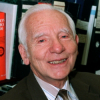Joseph Rotblat

Joseph Rotblat
Sir JosephRotblat KCMG CBE FRSwas a Polish physicist, a self-described "Pole with a British passport". Rotblat was the only physicist to leave the Manhattan Projecton the grounds of conscience. Rotblat's work on nuclear fallout was a major contribution toward the ratification of the 1963 Partial Nuclear Test Ban Treaty. A signatory of the Russell–Einstein Manifesto, he was secretary-general of the Pugwash Conferences on Science and World Affairs from their founding until 1973. He shared, with the Pugwash Conferences, the 1995...
NationalityPolish
ProfessionPhysicist
Date of Birth4 November 1908
CountryPoland
Since the end of the Cold War two main nuclear powers have begun to make big reductions in their nuclear arsenals. Each of them is dismantling about 2,000 nuclear warheads a year.
As for the assertion that nuclear weapons prevent wars, how many more wars are needed to refute this arguments? Tens of millions have died in the many wars that have taken place since 1945.
Then, we were told that a world war was prevented by the existence of nuclear weapons. Now, we are told that nuclear weapons prevent all kinds of war.
The cold war is over, but cold war thinking survives.
This is the reality of nuclear weapons: they may trigger a world war; a war which, unlike previous ones, destroys all of civilization.
The most terrifying moment in my life was October 1962, during the Cuban Missile Crisis. I did not know all the facts - we have learned only recently how close we were to war - but I knew enough to make me tremble.
The quest for a war-free world has a basic purpose: survival. But if in the process we learn how to achieve it by love rather than by fear, by kindness rather than by compulsion; if in the process we learn to combine the essential with the enjoyable, the expedient with the benevolent, the practical with the beautiful, this will be an extra incentive to embark on this great task.
So I ask the nuclear powers to abandon the out-of-date thinking of the Cold War period and take a fresh look. Above all, I appeal to them to bear in mind the long-term threat that nuclear weapons pose to humankind and to begin action towards their elimination.
But scientists on both sides of the iron curtain played a very significant role in maintaining the momentum of the nuclear arms race throughout the four decades of the Cold War.
My short-term vision is the abolition of nuclear weapons. My long-term vision is the abolition of war.
To sum up, there is no evidence that a world without nuclear weapons would be a dangerous world. On the contrary, it would be a safer world, as I will show later.
But there are other areas of scientific research that may directly or indirectly lead to harm to society. This calls for constant vigilance.
Several studies, and a number of public statements by senior military and political personalities, testify that - except for disputes between the present nuclear states - all military conflicts, as well as threats to peace, can be dealt with using conventional weapons.
There is no direct evidence that nuclear weapons prevented a world war. Conversely, it is known that they nearly caused one.